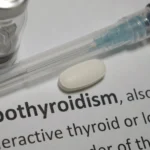Hyperthyroidism Decoded: Exploring Causes, Symptoms, and Treatment Options
Hyperthyroidism is a condition that occurs when the thyroid gland produces an excessive amount of thyroid hormone. This hormonal imbalance can have a profound impact on various bodily functions and overall health. In this article, we will delve into the causes, symptoms, and treatment options for hyperthyroidism.
Causes of Hyperthyroidism
Several factors can contribute to the development of hyperthyroidism. The most common cause is an autoimmune disorder known as Graves’ disease. In this condition, the immune system mistakenly attacks the thyroid gland, causing it to produce more hormones than the body needs.
Another potential cause of hyperthyroidism is the presence of thyroid nodules. These abnormal growths on the thyroid gland can lead to excess hormone production. In some cases, hyperthyroidism may also be triggered by certain medications, such as amiodarone or lithium.
Furthermore, inflammation of the thyroid gland, known as thyroiditis, can also result in hyperthyroidism. This inflammation can be caused by viral infections, radiation therapy, or even pregnancy.
Also Check: Hypothyroidism: Understanding Causes, Symptoms, and Management
Symptoms of Hyperthyroidism
The symptoms of hyperthyroidism can vary from person to person, but there are some common signs to watch out for. These include:
- Unexplained weight loss, despite increased appetite
- Increased heart rate and palpitations
- Anxiety, restlessness, and irritability
- Tremors and shaking hands
- Heat intolerance and excessive sweating
- Changes in menstrual patterns
- Difficulty sleeping
- Thin, brittle hair and nails
- Enlarged thyroid gland (goiter)
If you experience any of these symptoms, it is important to consult with a healthcare professional for an accurate diagnosis.
Hyperthyroidism Treatment Options
When it comes to treating hyperthyroidism, several approaches can be considered. The choice of treatment depends on the underlying cause, the severity of symptoms, and the individual’s overall health.
One common treatment option is the use of antithyroid medications. These medications work by reducing the production of thyroid hormone, helping to restore hormonal balance. Examples of antithyroid medications include methimazole and propylthiouracil.
In some cases, radioactive iodine therapy may be recommended. This involves taking a radioactive iodine pill that selectively destroys the overactive thyroid cells. While this treatment is effective, it can lead to an underactive thyroid in the long term, requiring lifelong thyroid hormone replacement.
Surgical removal of the thyroid gland, known as a thyroidectomy, is another treatment option. This is usually reserved for cases where other treatments have failed or when there is a concern about thyroid cancer.
Additionally, beta-blockers may be prescribed to help manage the symptoms of hyperthyroidism, such as rapid heart rate and tremors. These medications do not treat the underlying cause but can provide temporary relief.
It is worth noting that the choice of treatment should be made in consultation with a healthcare professional who will consider the individual’s specific circumstances and medical history.
Conclusion
Hyperthyroidism is a condition that requires proper diagnosis and treatment. Understanding the causes, recognizing the symptoms, and exploring the available treatment options can help individuals effectively manage this hormonal imbalance. If you suspect that you may have hyperthyroidism, seek medical advice to ensure accurate diagnosis and appropriate treatment.


People reacted to this story.
Show comments Hide comments[…] Also Check: Hyperthyroidism Decoded: Exploring Causes, Symptoms, and Treatment Options […]